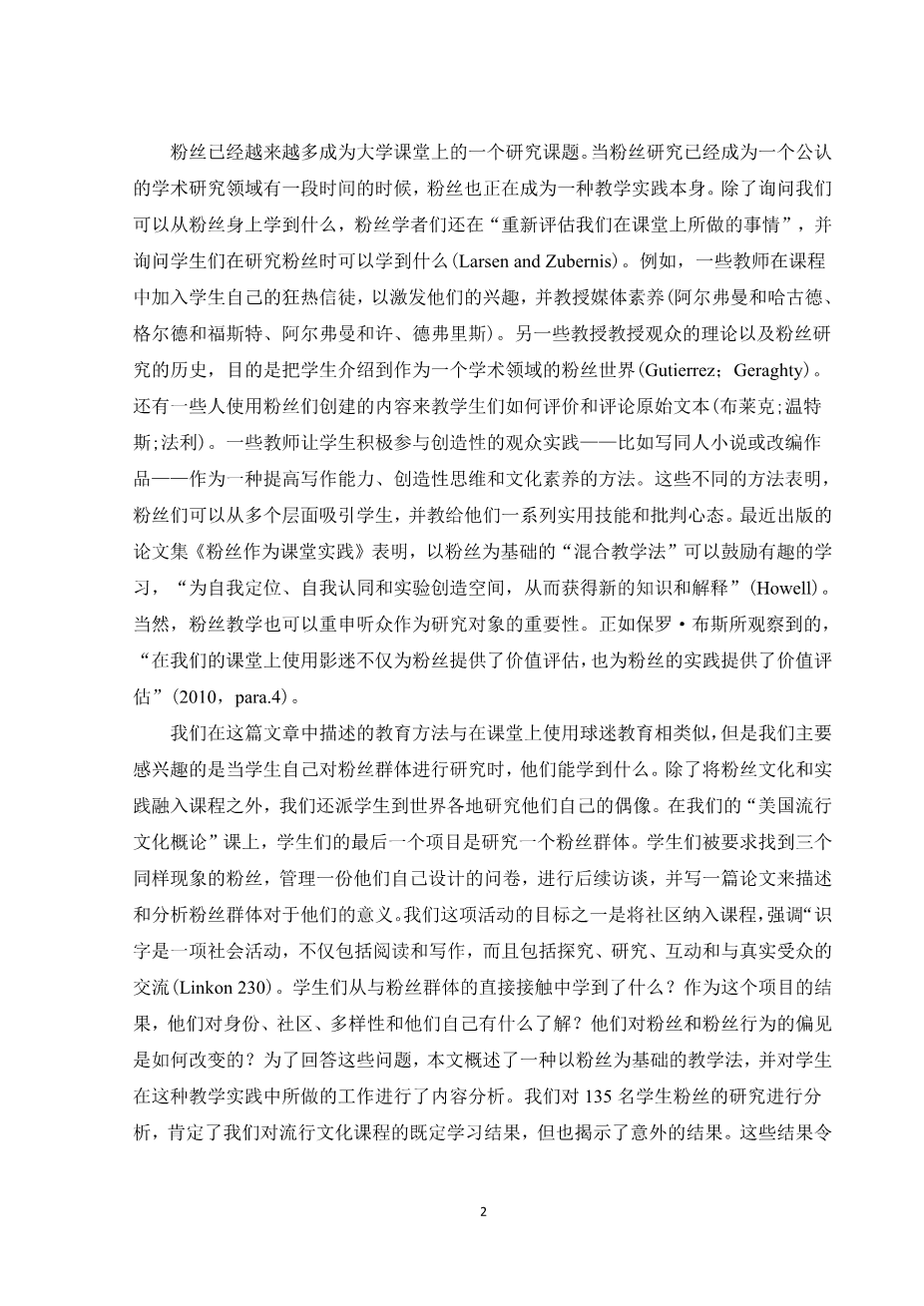Engaging fan cultures: What students learn when they study fans
Adam Golub,
California State University, Fullerton, USA
Ashley Loup,
University of Iowa, USA
Abstract
This essay describes a fan-based pedagogy and the learning outcomes it produced among college students. We focus on a fandom assignment given in an lsquo;Introduction to American Popular Culturersquo; course in an American Studies department at a large state university. The assignment required students to conduct a study of a fan community of their choice.
Students developed and administered questionnaires, conducted interviews, and wrote essays describing and interpreting their findings. They were required to include a reflective paragraph discussing what they learned about fandom as a result of their research. Using content analysis, we coded 135 essays from four sections of the class to identify how students spoke about what they learned. Students reported acquiring a deeper understanding of the role of fandom in constructing identity and community. In addition, many questioned and changed their preconceptions about fans and fan behavior. A number also noted that they acquired an appreciation for the theories and methods of academic fan studies. A majority of students indicated that studying fandom resulted in greater self- awareness and awareness of others. We make the case that learning and applying the methods of fan studies prepares students to engage the world outside the classroom with a more critical and reflective lens.
Keywords: fandom, pedagogy, teaching, learning
Introduction
lsquo;I now understand there is more to being a fan than just dressing up or collecting things.rsquo;
--Student who conducted research on Star Wars fan
Increasingly, fandom has become a topic of study in college and university classrooms. While fan studies has been a recognized field of academic inquiry for some time now, fandom is also becoming a pedagogical practice in its own right. In addition to asking what we can learn from studying fans, fan scholars are lsquo;reassessing what we do in the classroomrsquo; and asking what students can learn when they study fandom (Larsen and Zubernis 3). Some instructors, for example, incorporate studentsrsquo; own fandom into the curriculum to spark their interest and teach media literacy (Alvermann and Hagood; Gerde and Foster; Alvermann and Xu; Devries). Others teach theories of audience reception as well as the history of fan studies in order to introduce students to fandom as an academic field (Gutierrez; Geraghty). Still others have used content created by fans to teach students how to evaluate and critique primary texts (Black; Winters; Farley). Some teachers have students engage actively in creative audience practices – composing fan fiction or adaptations, for instance – as a way of developing writing proficiency, creative thinking, and cultural literacy (Alvermann; Jessop; Smol; Booth 2012). These various approaches suggest that fandom can engage students on multiple levels and teach them a range of practical skills and critical mindsets. The recently published essay collection Fandom as Classroom Practice makes the case that a fan-based lsquo;remix pedagogyrsquo; can encourage playful learning that lsquo;creates space for self-positioning, self-identification, and experimentation that leads to new knowledge and interpretationsrsquo; (Howell 9). Teaching fandom, of course, can also reaffirm the significance of the audience as an object of inquiry. As Paul Booth observes, lsquo;Putting fandom to use in our classrooms not only valorizes the fan, but also valorizes the practices of fandomrsquo; (2010, para. 4).
The pedagogy we describe in this essay similarly puts fandom to use in the classroom, but we are primarily interested in what students can learn when they conduct their own studies of fan communities. In addition to bringing fan cultures and practices into the curriculum, we also send students out into the world to research fandom for themselves. The final project for students in our lsquo;Introduction to American Popular Culturersquo; class is to study a fan community.1 Students are required to find three fans of the same phenomenon, administer a questionnaire of their own design, conduct follow-up interviews, and write a paper that describes and analyzes the meaning of fandom for their informants.
One of our goals with this activity is to incorporate community into the curriculum, to emphasize lsquo;literacy as a social activity, encompassing not simply reading and writing but inquiry, research, interaction, and communication with real audiencesrsquo; (Linkon 230). What do students learn from this direct engagement with fan communities? What do they come to understand about identity, community, diversity, and themselves as a result of this project? How do their preconceptions about fans and fan behavior change, if at all? To answer these questions, this essay outlines a fan-based pedagogy and offers a content analysis of the work students produced in response to this teaching practice. Our analysis of 135 student fandom studies affirmed our stated learning outcomes for our popular culture course, but also revealed unanticipated outcomes. These outcomes were heartening onmany levels, but they also suggested the need to refine our pedagogy, especially with regards to teaching students about fandom and diversity. Ultimately, in what follows, we argue that students gain a greater appreciation for the value of fan communities and a deeper understanding of themselves when they learn how to study fandom.
Pedagogy: Teaching Students How to Study Fans
American Studies 300, lsquo;Introduction to American Popular Culture,rsquo; is a General Education (G.E.) course taught at a large state university in Southern California. The course is designed to introduce students to the history of U.S. popular culture w
剩余内容已隐藏,支付完成后下载完整资料


英语译文共 13 页,剩余内容已隐藏,支付完成后下载完整资料
资料编号:[425495],资料为PDF文档或Word文档,PDF文档可免费转换为Word


